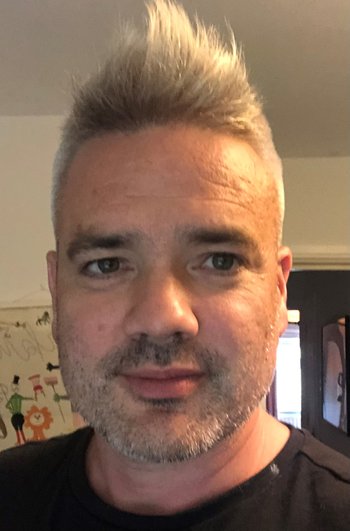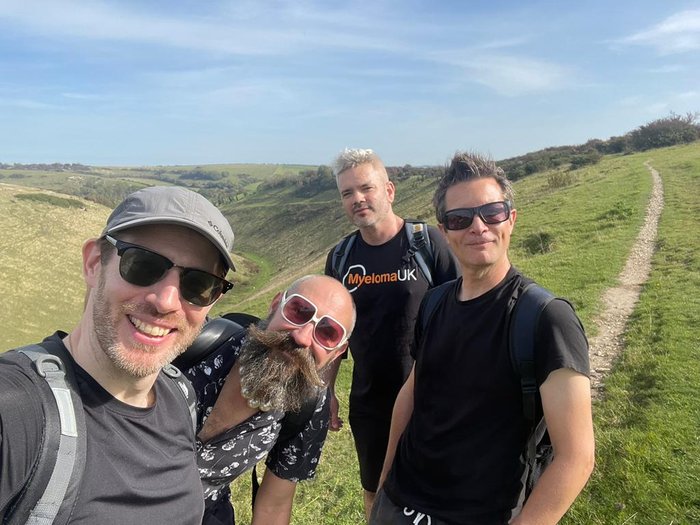How counselling can help after a blood cancer diagnosis
A blood cancer diagnosis can be mentally as well as physically challenging. David explains how talking about it can help.

I was diagnosed with myeloma at the age of 44. It was totally unexpected, as these things often are. I was in a sort of emergency state – in chaos really. All over the place. I didn’t take much persuading to see a counsellor. I’d had a lot of counselling before so I was pretty comfortable with the idea.
I was lucky enough to be offered face-to-face counselling at my hospital, for free.
It’s not an easy process, and it doesn’t always feel like it’s working. But I think most people will find that it does work, if you give it time.
Counselling helps you put your experience into words, which for me is really important. Just articulating things is a way of understanding.
Face to face counselling
I had two counsellors at the hospital because the first one left after a few months. At first, I was very traumatised. I was encouraged to be more in the moment and present, as a way of coming out of my traumatised state. This was hard as I thought, “I am in the moment. I don't like the moment!”
When I started with the second therapist, I was further on in the process. I went from feeling like I was completely failing to deal with the situation to them pointing out all the ways I was actually succeeding. I recognised that although I was not happy or enjoying any of my treatment, I was doing it and pushing through.
It was transformative, really, in terms of helping me think differently about what I was experiencing.
Talking to a mental health professional gives you an outside view, and highlights areas of yourself that you don't see. You're just lost in this overwhelming ocean of things that are battering you all over the place. And that therapy session once a week is like a life raft you jump on, that’s stable in the chaos. It gives you a kind of vantage point to survey the ocean. There’s somebody else looking out with you and pointing things out for you.
You can talk about all the things you're most afraid of, all the stuff that's really worrying you.
You might discuss the worst-case scenario. But then you realise you’re not there. You're here. So you get a more helpful perspective and the trauma is contained.
Counselling also allows you to talk about how you're feeling in a way that isn't going to upset somebody else. You're not talking to your mum, your partner or your kids. Again, your feelings are contained. If you share your darkest thoughts with your family, they have to deal with that. A counsellor is a professional and not personally involved, so it doesn’t impact them in the same way.
Online counselling
As well as the hospital counselling service, I got some free online counselling from Macmillan. We had some good conversations, and it did help me process things. I wasn’t necessarily expecting an outcome from any of these sessions, because the conversation is the outcome, really.
If you’re offered online counselling, try it, especially if it’s free. It will probably be a limited number of sessions, so look on it as an introduction. But then ask, what can I do next?
For me, face to face is better. More connected. Online works, but it's almost like you feel less when you’re talking online. And when the session is over, you just close the laptop like it never happened. That’s how it felt to me anyway, but I still think online counselling is better than no counselling, especially if it is the only option.
Choosing a private counsellor
I stopped going to the hospital counsellor mainly because I found it challenging to go back to the hospital every week. I'm seeing someone else now, someone I chose myself, to help me with this less acute phase of things.
If you asked me what I look for in a counsellor, I would suggest you consider:
- Are they accredited by a professional body like the British Association for Counselling and Psychotherapy or UK Council for Psychotherapy?
- How long have they been practising?
- Do you like the approach they take? See what their website says and whether it chimes with you.
- What are their areas of interest, for instance, cancer experience, trauma, body image? What do you want help with?
I’ve chosen someone who is very experienced and takes a psychodynamic approach, which is a modern take on psychoanalysis. My therapist also worked in the NHS hospital system for a long time. As I am still in that system (on maintenance treatment), that was important to me.

Non-professional help
Early on I signed up for one-to-one peer support and a support group that meets online and has a WhatsApp group. Both were though Myeloma UK.
Peer support works because you meet people who are somewhere else, beyond the chaos, and they are proof you can get there too. It’s another stabiliser at a very unstable time.
There may be a lot of people in a group, with a lot of different experiences. Some people are having a tough time, others are having an easier time at that point. That can be tricky, but looking at things in the context of other people’s experience does help you to reflect on your own.
I’ve also got my own little group where I live, with people I have met through other support groups or social media. We message and sometimes meet up for coffee or a drink.
Having this kind of support network means you don’t feel alone. You have an instant connection – you just say what you’re going through, and they say, “Oh yeah, I get that.” It feels like we are in this together.

Talk to other people affected by blood cancer
Hear from and connect with people who understand.
